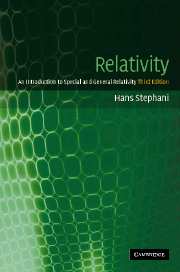Book contents
- Frontmatter
- Contents
- Preface
- Notation
- Part I Special Relativity
- Part II Riemannian geometry
- 14 Introduction: The force-free motion of particles in Newtonian mechanics
- 15 Why Riemannian geometry?
- 16 Riemannian space
- 17 Tensor algebra
- 18 The covariant derivative and parallel transport
- 19 The curvature tensor
- 20 Differential operators, integrals and integral laws
- 21 Fundamental laws of physics in Riemannian spaces
- Part III Foundations of Einstein's theory of gravitation
- Part IV Linearized theory of gravitation, far fields and gravitational waves
- Part V Invariant characterization of exact solutions
- Part VI Gravitational collapse and black holes
- Part VII Cosmology
- Bibliography
- Index
21 - Fundamental laws of physics in Riemannian spaces
Published online by Cambridge University Press: 05 May 2010
- Frontmatter
- Contents
- Preface
- Notation
- Part I Special Relativity
- Part II Riemannian geometry
- 14 Introduction: The force-free motion of particles in Newtonian mechanics
- 15 Why Riemannian geometry?
- 16 Riemannian space
- 17 Tensor algebra
- 18 The covariant derivative and parallel transport
- 19 The curvature tensor
- 20 Differential operators, integrals and integral laws
- 21 Fundamental laws of physics in Riemannian spaces
- Part III Foundations of Einstein's theory of gravitation
- Part IV Linearized theory of gravitation, far fields and gravitational waves
- Part V Invariant characterization of exact solutions
- Part VI Gravitational collapse and black holes
- Part VII Cosmology
- Bibliography
- Index
Summary
How does one find the fundamental physical laws?
Before turning in the next chapter to the laws governing the gravitational field, that is, to the question of how the matter existing in the universe determines the structure of the Riemannian space, we shall enquire into the physical laws which hold in a given Riemannian space; that is to say, how a given gravitational field influences other physical processes. How can one transcribe a basic physical equation, formulated in Minkowski space without regard to the gravitational force, into the Riemannian space, and thereby take account of the gravitational force?
In this formulation the word ‘transcribe’ somewhat conceals the fact that it is really a matter of searching for entirely new physical laws, which are very similar to the old laws only because of the especially simple way in which the gravitational field acts. It is clear that we shall not be forced to the new form of the laws by logical or mathematical considerations, but that we can attain the answer only by observation and experiment. In searching for a transcription principle we therefore want our experience to be summarized in the simplest possible formulae.
In the history of relativity theory the principle of covariance plays a large rôle in this connection. There is no clear and unique formulation of this principle; the opinions of different authors diverge here.
Information
- Type
- Chapter
- Information
- RelativityAn Introduction to Special and General Relativity, pp. 156 - 172Publisher: Cambridge University PressPrint publication year: 2004
